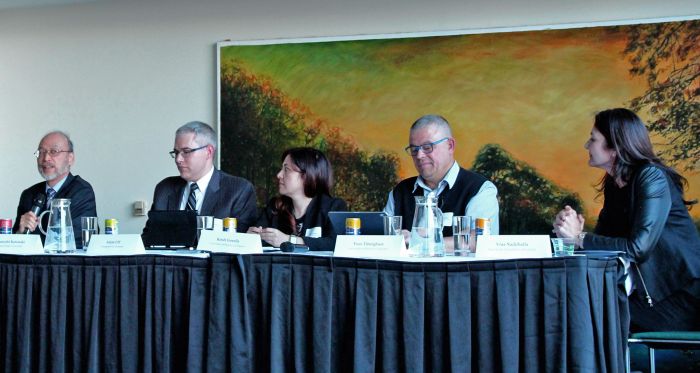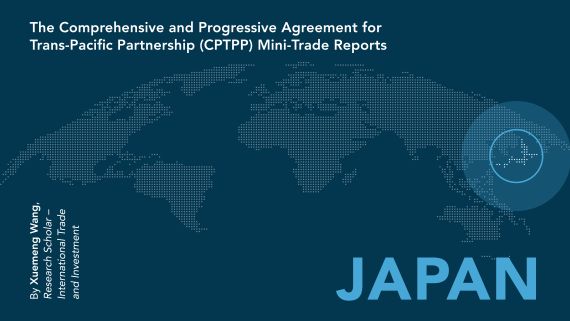On March 12, 2024, the Asia Pacific Foundation of Canada and the David Lam Centre at Simon Fraser University, with support from the Consulate General of Japan in Vancouver, convened a panel of experts for a discussion on the rapid changes taking place in Japanese foreign policy and what lessons and opportunities there may be for Canada. The panellists (in order of appearance) included:
- Kristi Govella, the inaugural Director of the Center for Indo-Pacific Affairs and an Assistant Professor of Asian Studies at the University of Hawai’i at Mānoa
- Yves Tiberghien, Professor of Political Science, Director Emeritus of the Institute of Asian Research, and Co-Director of the Centre for Japanese Research at the University of British Columbia
- Adam Liff, the Visiting Chair in Modern and Contemporary Japanese Politics and Foreign Policy at Georgetown University’s Edmund A. Walsh School of Foreign Service
- Tsuyoshi Kawasaki, Professor of Political Science at Simon Fraser University
Vina Nadjibulla, Vice-President, Research & Strategy, APF Canada, moderated the discussion. Highlights from their discussion can be found below, and a video recording of the full conversation is available on APF Canada’s website.
Japan in an Evolving International and Regional Context
Japanese foreign policy is undergoing a significant transformation as its military, diplomatic, and economic engagement becomes increasingly robust, extensive, and proactive. Although these changes have been underway for years, the psychological impact of the 2022 Russian invasion of Ukraine – and the possibility of a similar event happening in East Asia – has accelerated this process.
In its 2022 Indo-Pacific Strategy (IPS), Canada identified Japan as one of its key partners in the region. The IPS’s philosophical underpinnings and priorities, moreover, echo a vision of a Free and Open Indo-Pacific (FOIP) first articulated by Japan in 2016. Japan thus welcomes Canada’s expressed commitment to contributing to regional peace, security, and prosperity, including in partnership with Japan and the two countries’ closest ally, the United States.
What should Canadians know about the drivers of change in Japanese foreign policy? What are the strengths of its approach and its regional relationships, and what might hamper its ambitions? Finally, how could Canada collaborate more closely with Japan on issues of mutual interest?
Factors Driving the Change in Japanese Foreign Policy
Professor Govella said that Japan is increasingly concerned about a breakdown of the international order. Economically, this includes the rise of populism and protectionism in several countries. On security, it includes the possibility that Russia’s invasion of Ukraine could set a dangerous precedent in East Asia, namely the possibility of Chinese aggression against Taiwan. Japan is, therefore, working to bolster the institutions that have served it well in the past, such as the United Nations and the World Trade Organization. At the same time, Japan recognizes that these institutions are increasingly inadequate for coping with changes in the international environment and is trying to fill the gaps with mini-lateral groupings such as the Quad and other bilateral and mini-lateral dialogues. Finally, while Japan still adheres to an exclusively defence-oriented security policy, it is nonetheless expanding its defence capabilities. That includes a commitment to raise its defence spending to an unprecedented two per cent of its gross domestic product (GDP) by 2027.
Japan is also trying to strike a balance between promoting economic connectivity and national security. While viewing economic interdependence as necessary for its economic growth, Govella said, Japan recognizes that over-reliance on a single country makes it vulnerable to economic coercion. To diversify its economic partners, Japan has signed and, in some cases, taken leadership in new economic arrangements, including the Comprehensive and Progressive Agreement for Trans-Pacific Partnership (CPTPP) and the Regional Comprehensive Economic Partnership (RCEP) agreement.
These issues, of course, are not things Japan can deal with on its own, and it is eager to build and participate in coalitions with like-minded countries, including Canada.
Opportunities – and Lessons – for Canada
Professor Tiberghien noted that one obstacle that the Japanese government is facing in funding the expansion of its defence capabilities is public sentiment; while the Japanese people broadly support a more robust defence posture, they do not support raising taxes to meet the two per cent spending threshold. This could change, however, in the event of a crisis that hits close to home.
With respect to Canada, Japan welcomes the Canadian military sending maritime patrols to the region but would prefer that Canada do more. Tiberghien suggested that Canada take note of Japan’s recently upgraded partnership with Australia. [That agreement includes a defence component – the deepening of operational co-operation, conducting joint military exercises, and improving interoperability.]
Canada can learn from Japan how to build strong, trust-based relationships with Southeast Asia and India – both critical partners for the success of Canada’s IPS. There has been a lot of talk recently about Canada’s commitment to Southeast Asia, explained Tiberghien, but stakeholders there want to see a more robust on-the-ground presence. They are also fatigued, he added, with talk of ‘Canadian values.’ These observations suggest that Canada should augment its regional presence, but in a way that prioritizes pragmatism. Similarly, the Japan-India relationship is strong. [In January 2024 the two countries marked the 10th anniversary of their “special strategic and global partnership,” built on a range of common interests: participation in the Quad, Japan’s role in facilitating India’s economic growth and transformation, Japan’s investments in building infrastructure in India, and the conducting of bilateral security exercises.] This relationship could be useful to Canada, said Tiberghien, which very much needs to find a way to restore a sense of normalcy in its relationship with New Delhi.
Economically, Japan is actively reviving its industrial policy, focusing on semiconductors, artificial intelligence, critical minerals, and green-tech. The Japanese government has greatly expanded staffing under the Prime Minister’s Office (PMO), empowering the prime minister to mobilize and funnel the resources needed to boost capital flow and investment, and to do so quickly. While there are risks in having a top-heavy, government-directed industrial policy, a well-executed industrial policy could quickly induce the changes needed to boost capital flow and investment.
Professor Tiberghien also noted a shift in Japan’s approach to China. The late Prime Minister Abe Shinzo, who stepped down in 2020, was a “great balancer” in that he initiated many of the current developments in Japanese foreign policy while remaining economically engaged with China. That approach mostly ended with the 2021 arrival of Prime Minister Fumio Kishida, who has sided much more decisively with the G7. While there is still some Japan-China engagement, it is much less proactive, said Tiberghien, and there has been a flood of Japanese disinvestment from China. He suggested that there is an opportunity for Canada to work with Japan in organizing a high-level Track 1.5 dialogue focused on relations with China and/or the broader Indo-Pacific region.
Grappling with a Lack of Urgency in Canada
Professor Liff underscored that given its geographic location, Japan is often at the vanguard of trying to strike a balance between international co-operation and division, continually trying to adjust to changes in the global environment. He added that Japan is likely to continue on its current course; while the tenure of current Prime Minister Kishida may not extend past the Liberal Democratic Party’s (LDP) leadership vote in September, the other LDP members in line to assume the role do not appear likely to divert from Kishida’s approach.
Liff also raised the question of whether Canada shares Japan’s sense of urgency about developments in the Indo-Pacific. Professor Kawasaki responded that Canada does not seem to share this sense of urgency. In fact, he said, Canada is struggling to figure out where and how it fits in the Indo-Pacific and its current policy is driven primarily by not wanting to be left out. This lack of urgency makes it difficult for Canada to mobilize the resources it would need to boost its attractiveness and reliability as a regional partner, Kawasaki said. He added that while Canada is not prepared to make frontline contributions in the event of a serious threat to regional security, it could provide rear-end support, such as information sharing, cybersecurity, behind-the-scenes co-ordination, maritime awareness, or helping to develop contingency plans.
Vina Nadjibulla asked the panellists to comment on what seemed most ‘do-able’ for Canada-Japan co-operation, particularly in the context of their comments about Canada’s lack of urgency and limitations.
- There was a consensus that Canada is nowhere close to feeling the sense of urgency witnessed in Japan, although this is not necessarily unique to Canada. Ottawa often appears to be functioning on autopilot, the panellists argued, focused more on domestic politics and not sufficiently attentive to longer-term strategic thinking that requires foresight and a recognition of the fundamental changes happening internationally.
- This lack of urgency is reflected in Canada’s defence budget, which will shrink rather than increase. The point is not to have an overly militarized IPS; however, boosting its defence capabilities would give Canada more options for contributing in meaningful ways to the region’s peace and security. Canada should fully expect that Washington will apply much stronger pressure for it to contribute military assets and not to become ‘dead weight’ in the alliance, the panellists argued. The natural places where Canada could do this are in the Indo-Pacific and the Arctic.
- Canada could partner with Japan in organizing a Track 1.5 summit that mobilizes several key bureaucracies and players and possibly includes European actors. This summit could focus on managing relationships with India and China – two regional heavyweights with which Canada’s bilateral relations are currently very poor. An inaugural summit could be held as early as next year.
- Focus on activities supporting economic security and supply chain resilience. For example, in 2024 Canada is chairing the CPTPP Commission and could facilitate Taiwan’s accession into that body. That is something that Japan has vocally supported.







